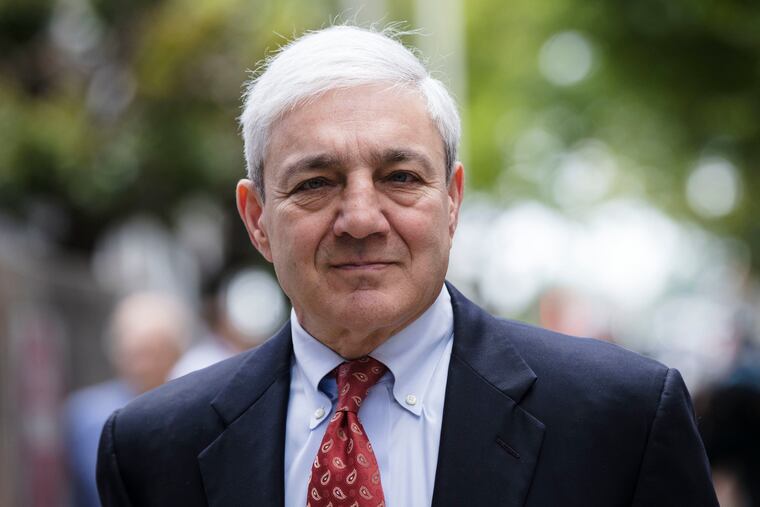Ex-Penn State president Graham Spanier’s conviction is reinstated by a federal appeals court
The court overturned a lower court decision dismissing the charges centered around Spanier’s mishandling of a 2001 claim involving assistant football coach Jerry Sandusky.

A federal appeals court on Tuesday reinstated the child-endangerment conviction of former Pennsylvania State University president Graham B. Spanier, ending a yearlong reprieve he received just hours before he was to begin serving a two-month jail sentence.
In a 34-page opinion, a three-judge panel of the U.S. Court of Appeals for the Third Circuit determined that a lower-court judge had improperly overturned a jury’s 2017 guilty verdict centering on Spanier’s mishandling of a 2001 claim of sexual abuse involving former Penn State assistant football coach Jerry Sandusky.
With his conviction — and sentence — now restored, it was not immediately clear Tuesday when Spanier, 72, might have to begin to serve that jail term.
His lawyers declined to comment on whether they would appeal.
In a statement, Pennsylvania Attorney General Josh Shapiro, whose office tried the case, said: “We will seek the enforcement of Spanier’s sentence at the first opportunity allowable under the law.”
The decision last year by a U.S. magistrate judge in Scranton to overturn Spanier’s conviction upended what had been the outcome of the final criminal trial in a scandal that had roiled Penn State and its football program for years.
By that time, Sandusky had been sentenced to prison for the sexual abuse of eight boys, and two other university administrators had pleaded guilty to crimes similar to those of which Spanier was ultimately convicted.
The one misdemeanor count on which the jury found Spanier guilty was specifically tied to his failure to adequately respond to the 2001 complaint lodged by Mike McQueary, the assistant coach who would testify in multiple trials that he reported seeing Sandusky abusing a boy in a locker-room shower.
Though Spanier has maintained that what McQueary described to him was nothing more than horseplay, the former university president and two top aides — former Penn State athletic director Tim Curley and ex-university vice president Gary Schultz — agreed to notify Sandusky’s charity for at-risk youth and the source of many of the ex-football coach’s victims, and to bar Sandusky from bringing boys onto campus.
But they did not report their concerns to police, noting instead — in an email from Spanier cited in Tuesday’s opinion by Circuit Judge D. Michael Fisher — that the only “downside” of that decision was if others did not take their warnings seriously enough “and we then become vulnerable for not having reported it.”
Spanier’s lawyers argued that state law at the time required only “a parent, guardian or other person supervising the welfare of children” to report suspected abuse and that as a college president he did not fall under any of those categories.
The law was revised in 2007 to also include people who “employ or supervise such a person,” but in arguing for Spanier’s conviction, prosecutors maintained the revision did not actually change the law but only clarified a category of mandatory reporter that had been inherently included.
That reasoning was endorsed by the state Superior Court, which denied Spanier’s first appeal, but it was later rejected by U.S. Magistrate Judge Karoline Mehalchick when she vacated his conviction last year. She suggested that the government’s interpretation of the child-endangerment statute was so unexpected that there was no way Spanier could have concluded at the time that it applied to him.
Writing Tuesday, the Third Circuit panel disagreed. “We conclude that it was not,” wrote Fisher, who was joined in the opinion by Circuit Judges Michael Chagares and David J. Porter.
Once ranked among the most well-respected, highest-paid, and longest-serving university presidents, Spanier was ousted from his post in the days after Sandusky’s arrest in 2011. He has said he regrets not acting more forcefully at the time of the McQueary complaint.
Spanier had been ordered to serve a 4-to-12-month sentence — after the first two months in jail, the rest was to be on house arrest — and perform 200 hours of community service. Though he remains a tenured faculty member at Penn State, he has not taught classes at the university in years. A spokesperson for the school declined to comment Tuesday.
Curley and Schultz both pleaded guilty to misdemeanor child-endangerment charges and testified as government witnesses in Spanier’s case. Both have since served jail terms and waived their appellate rights as part of their plea agreements with the government.
Sandusky is serving a 30- to 60-year sentence at a state prison in Somerset County.
Staff writer Susan Snyder contributed to this article.